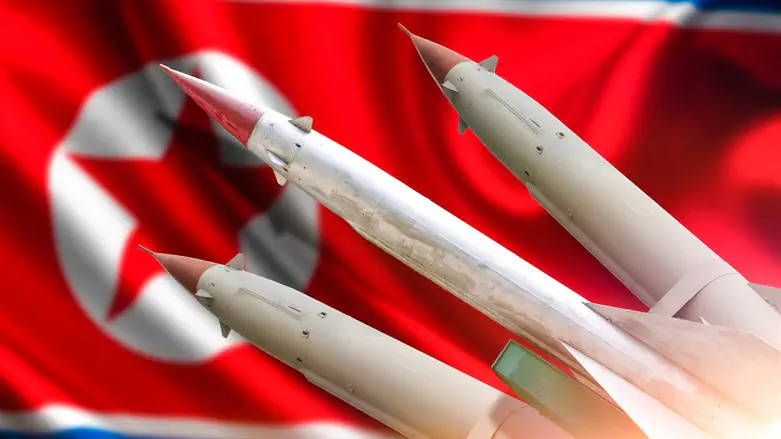
When shall we three meet again?
In thunder, lightning, or in rain?
(The Three Witches in Macbeth)
Bad things can sometimes come in threes. For Israel, issues of enemy nuclearization are many-sided, intersecting and “bewitching.” Even while the Jewish State remains the only regional nuclear power, a nuclear war could still happen.
Plausible scenarios demand prompt clarification. Even a pre-nuclear Iran could bring Israel to the point where Jerusalem’s only strategic options would be nuclear escalation or de facto capitulation. Terminologically, the first option would present as an “asymmetrical nuclear war.” Substantively, this option would spawn variously unpredictable consequences.
There will be antecedent questions. How could Israel allow itself to reach such an existential impasse? How could such an unprecedented scenario emerge? Is such a perilous declension even reasonable to ponder?
In one scenario, Iran would target Israel’s Dimona nuclear reactor and/or employ radiation dispersal weapons against the Jewish State. Unique escalations could follow in the wake of an Iranian resort to biological or electromagnetic pulse (EMP) ordnance. There could also be direct interventions by already-nuclear state allies of Iran. Here, in circumstances that could involve US and/or Chinese interventions, Israel could be prevented from striking preemptively against Iranian targets by Russian and/or North Korean nuclear threats.
The plausibly worst-case scenario would be a “bolt-from-the-blue” nuclear attack by North Korea. Kim Jung Un’s troops are already training for military action against Ukraine. This training, on behalf of Vladimir Putin, is well-underway inside Russia.
Where should Jerusalem stand on resisting such potentially existential challenges from Iran’s nuclear state surrogates?
Looking toward expanding conflict with Iran, any “one-off” preemption against enemy weapons and infrastructures (an act of “anticipatory self-defense” under international law) would be problematic. At this late stage, any such defensive action would need to be undertaken in calculated increments and amid an ongoing war.
For Israel, these are intellectual issues, not mere matters of “common sense.” During intersecting and possibly synergistic interactions, an imaginative dialectic would need to guide Israel’s strategic policy. As part of its escalating war against Iran, Israel could calculate that it had no choice but to launch multiple and mutually-reinforcing preemptive strikes against specific nuclear-related targets. Simultaneously, Russian and/or North Korean threats of support for Iran could lay the groundwork for a multi-state nuclear war, a sui generis conflict that could sometime involve the United States and/or China.
In Jerusalem, such a worrisome narrative ought never to be dismissed out of hand. It could be tempting to regard such jaw-dropping interventions as “speculative” or “unlikely,” but there would remain no science-based way to estimate the probabilities of a unique event. True probabilities, Israeli planners should understand, can never be determined ex nihilo (“out of nothing”).
In the final analysis, Israel’s requires “high thinkers,” and these exceptional planners will need to make decisions based on long-established standards of valid extrapolation, deduction and internal consistency. Though there is no actual data on the subject of nuclear war, a useful deductive apparatus can still be constructed. The legitimate object of this explanatory apparatus would be the systematic derivation of logically entailed and policy-relevant conclusions from tangibly interconnecting assumptions. Without such an effort, of analytic necessity, Israeli strategic decisions could be limited to more-or-less disconnected assessments or (worst of all possibilities) “common sense.” For Israeli strategists, there could be no greater mistake than any reliance upon “common sense.”
To the extent that they might be usefully estimated, the risks of an Israel-Iran nuclear war will depend on whether such a conflict would be intentional, unintentional, or accidental. Apart from applying this three-part distinction, there would be no adequate reason to expect operationally-gainful intellectual assessments.
Ensuring existential protections from openly declared Iranian aggressions, Jerusalem should always bear in mind that even the Jewish State’s physical survival ought never to be taken for granted. At some point, even a seemingly powerful nuclear weapons state could be left with only militarily irrelevant options. That point would allow assorted residual options for revenge, but none for durable safety and national security.
An unintentional or inadvertent nuclear war between Jerusalem and Teheran could take place not only as the result of misunderstandings or miscalculations between rational leaders, but also as the unintended consequence of mechanical, electrical, or computer malfunction. This brings to mind a further distinction between unintentional/inadvertent nuclear war and accidental nuclear war. Though all accidental nuclear wars must be unintentional, not every unintentional nuclear war must be by accident.
On one occasion or another, an unintentional or inadvertent nuclear war could be the result of fundamental human misjudgments about enemy intentions. By definition, this result would be catastrophic. It could prove to be irremediable and irreversible.
In all related calculations, history will matter. An authentic nuclear war has never been fought. Accordingly, there are no experts on “conducting” or “winning” a nuclear war. Immediately, in Jerusalem, this understanding should be considered axiomatic and overriding.
About the need for “high thinkers,” who should be Israel’s models for such extraordinary intellectual capacity? In essence, we are speaking here of the caliber of Szilard, Fermi, Oppenheimer, Einstein, Bohr and assorted others, not to fabricate another “gadget” (the euphemism used by Manhattan Project physicists about their goal), but to orchestrate Israel’s nuclear deterrent via coherent postures of calculated non-use.
Such planning should always be initiated and expanded at an advanced theoretical level. This task could never be suitably assigned to operational specialists, even the “smartest” and most reliable. For Israel, much more will be needed than capable and industrious professionals.
Providing for Israeli national security amid a still-nuclearizing Iran ought never to be treated as a "game of chance.” Without a systematic and theory-based plan in place, Israel would render itself unprepared for an Iranian nuclear conflict that is deliberate, unintentional or accidental. At every stage of its self-propelling competition with Tehran, Jerusalem should never lose sight of the only sensible rationale for maintaining national nuclear weapons and doctrine. That rationale is (1) stable war management at all identifiable levels; and (2) reliable nuclear deterrence of all applicable threats.
Most urgently, Israel’s strategic plans will have to include prompt policy shift from “deliberate nuclear ambiguity” to “selective nuclear disclosure.” The animating logic of this shift would not be to reframe the obvious (i.e., that Israel is an extant nuclear power), but to remind all would-be aggressors that Jerusalem’s nuclear weapons are operationally usable at every level of warfare. Nonetheless, even with optimal prudential planning, Russian and/or North Korean threats to Israel could become overwhelming.
Reduced to its essentials, a worst case scenario for Israel would commence with progressively explicit threats from Moscow about Israeli preemption costs. Israel, aware that it could not reasonably expect to coexist indefinitely with a nuclear Iran, would proceed with its planned preemptions in spite of dire Russian warnings. In subsequent response, Russian military forces would begin to act directly against Israel, seeking to persuade Jerusalem that Moscow is in a superior position to dominate all conceivable escalations. Alternatively, Putin could delegate such military responsibilities to North Korea, an Iranian ally that is presently preparing (within Russia itself) to augment Russian military forces against Ukraine.
For Vladimir Putin, such a persuasive effort should not be a “hard sell.” Unless the United States were willing to enter the already-chaotic situation with openly unrestricted support for Israel, Moscow would have no foreseeable difficulties in establishing “escalation dominance.” Correspondingly, well-intentioned supporters of Israel could over-estimate the Jewish State’s relative nuclear capabilities and options, a judgment that Sigmund Freud would likely have called “wish fulfillment” and that could steeply endanger Israel’s physical survival.
In war, even state-of-the-art military operations would have determinable limits. In essence, there is no clear way in which the capabilities and options of a state smaller than America’s Lake Michigan could “win” at competitive risk-taking vis-à-vis Russia or North Korea. For Israel in such tangibly asymmetrical circumstances, self-deflating candor would prove safer than any self-deluding bravado.
As a strategic objective, Israel ought always to avoid armed struggle against a vastly superior nuclear adversary. This imperative would not pose problems with regard to a newly-nuclear Iran (though Jerusalem ought still to do whatever possible to prevent Iranian nuclearization), but it would present a very serious problem if it concerned an already “mature” nuclear adversary in Pyongyang.
What about the United States? Would the incoming American president accept an alliance commitment that could place millions of citizens in positons of existential vulnerability? If Donald Trump would accept the long-term benefits of honoring US security guarantees to allies, the world could be looking at another Cuban Missile Crisis or some similar kind of confrontation. A direct military confrontation with Russia would not be one in which Israel could ever reasonably expect to prevail.
There will be additionally important issues of nuclear doctrine. In his continuing war of aggression and genocide against Ukraine, Vladimir Putin has been recycling provocative elements of Soviet-era strategic thinking. One critical element concerns the apparent absence of any “firebreak” between conventional and tactical nuclear force engagements. Now, much as it was during the “classical” era of US-Soviet nuclear deterrence, Moscow identifies the determinative escalatory threshold with first-use of high-yield, long-range strategic nuclear weapons, not first use of tactical (theater) nuclear weapons.
This “fuzzy” nuclear escalation doctrine is not shared by Israel’s United States ally, and could erode any once-stabilizing barriers of intra-war deterrence between Moscow and Washington. Whether sudden or incremental, such erosion could impact the plausibility of both deliberate and inadvertent nuclear war. As Israel could need to depend on firm US support in countering Russian nuclear threats, Vladimir Putin should be granted an immediately prominent place in Israel’s threat assessments of Iranian nuclear progress.
For Israel, the bottom-line of all such dialectical analysis is the invariant obligation to analyze strategic options as an intellectual task. Among other things, reaching rational judgments on defensive first strikes against a still pre-nuclear Iran will require informed anticipations of (1) Russian and/or North Korean intentions; and (2) United States willingness to stand by Israel in extremis.
Israel’s growing nuclear war hazards include variously tangible scenarios of Russian or North Korean interventions on behalf of Iran.
In Jerusalem’s continuously nuanced calculations, these scenarios should assume primary importance. Sometimes, as in Shakespeare’s Macbeth, a bewitching tragedy can come in threes.
LOUIS RENÉ BERES(Ph.D., Princeton, 1971) is Emeritus Professor of International Law at Purdue.His twelfth and most recent book is Surviving Amid Chaos: Israel's Nuclear Strategy (2016) (2nd ed., 2018).
In 2003-2004, Professor Beres was Chair of Israel’s Project Daniel (Iran nuclear weapons threat). His scholarly publications include multiple annual contributions to the Oxford University Press Yearbook on International Law and Jurisprudence and articles in the Bulletin of the Atomic Scientists.
